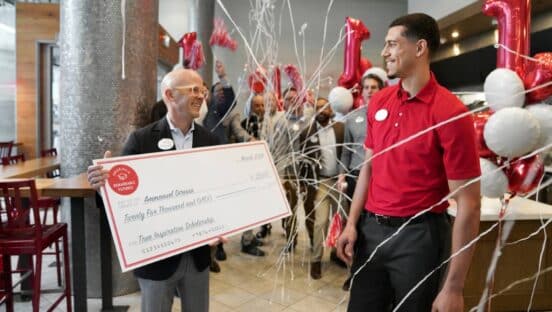Amid the global financial crisis, with the world’s largest banks reporting losses in the billions of dollars, Duane Clark, a 24-year veteran of the commercial banking industry, did something he never expected to do: He opened a smoothie shop.
“I always swore I would never go into the restaurant business,” Clark says. “I always called it the beast. You live it, you drink it, you eat it—that’s your life.”
But in October of 2009, Clark opened a Tropical Smoothie Café in Panama City Beach, Florida. On June 12, he opened a second location further north along the Sunshine State panhandle in Pensacola.
At AmSouth Bank (now Regions Bank), Clark had helped Tropical Smoothie Café, which is based in Destin, Florida, get financing to open several locations. Over the years, he met the company’s corporate officers and gained a nuanced understanding of how Tropical Smoothie operated.
As a banker, Clark knew how to evaluate an investment, and he concluded that a concept offering low-priced food and smoothies was a winner in a down economy. He also liked Tropical Smoothie’s young, health-conscious customer base.
But above all, Clark was looking for something steady after one of the most chaotic years in the history of global finance, when giant banks teetered and some, like Lehman Brothers, toppled.
“The draw was the stability, and that quick service has shown such growth trends,” Clark says.
With a money background, Clark says he avoided a common mistake of the upstart restaurant operator: incorrectly assessing costs.
“Most people getting into it don’t understand the financing, and financing is crucial,” he says. “They don’t know how to manage their cash.”
Patrice Rice, whose firm recruits for the hospitality industry, including Yum! Brands and Arby’s, understands the appeal of the restaurant industry in the wake of the financial crisis.
“People with money are looking for ways to invest that can create income rather than gambling on the stability of the stock market,” Rice says. “They are buying restaurant franchises because it is a stable industry.”
Quick service in particular is an attractive investment, Rice says, because of the low start-up and build-out costs, limited menus, and the potential to capture the breakfast, lunch, and dinner markets.
While a finance background may help operators, restaurants and banks are very different animals and, Rice says, “You have to be smart enough to know what you don’t know.”
“If you’re going to invest that money,” she says, “invest it in a strong director of operations who can tell you what needs to be done to be successful in this business.”
John Cassity, a former commercial lender with J.P. Morgan Chase and Bank of America, bought the first of his six Einstein Bros. Bagels in Colorado’s Western Slope in 2008. He says it was a coincidence that he left the financial industry on the eve of catastrophe.
“We laugh about how I got out at the right time,” he says. “But that was not planned at all.”
As a banker, Cassity had worked with several quick serves, including Einstein Bros., and had a detailed understanding of the business before he became a franchisee himself.
“We peeled back the layers of the onion with every restaurant relationship that we had in order to understand the business as well or better than the operators themselves,” he says. “We knew the space that they operated in, the trends that were going on, the greatest risks they faced, and the relationship between the franchisor and the franchisees.
“It was very intimate,” Cassity says, “and it gave me a tremendous insight as to how I would operate my stores.”
Of all his restaurant clients, Cassity says he chose Einstein Bros. because of the “integrity of its brand.” While his banking background helps him as a franchisee, he says he has sometimes leveraged his financial acumen “to a fault” by scrutinizing food costs too closely.
“There’s a level where you have to have some breathing room and leeway, so that you don’t micromanage to the point that it’s affecting the customer’s experience,” Cassity says.
Overall, Cassity says his past life in the demanding financial world prepared him well for the high stress of the restaurant business.
“In the financial industry, there is a lot of pressure from senior management,” he says. “There are a lot of goals, a lot of pressure, a lot of tasks. So you have the right caliber of person who can handle what goes on in restaurant operations.”
Ryan Achterhoff managed six banks in Northwest Iowa before joining Hull, Iowa–based Pizza Ranch at the corporate level in 2002 and becoming a franchisee a year ago. He agrees that experience managing cash and stress makes financial professionals uniquely suited to running restaurants.
But that isn’t the main reason he left banking behind.
“When people go out to eat, they’re in a great mood,” he says. “Compare that to the medical industry, for example, where you tend to see people on their worst day. We’re seeing people on their best day.
“So a big part of it is, it’s a fun industry,” Achterhoff says. “You have a chance to serve people and give back to communities and create communities, which is why I wanted to be involved.”










